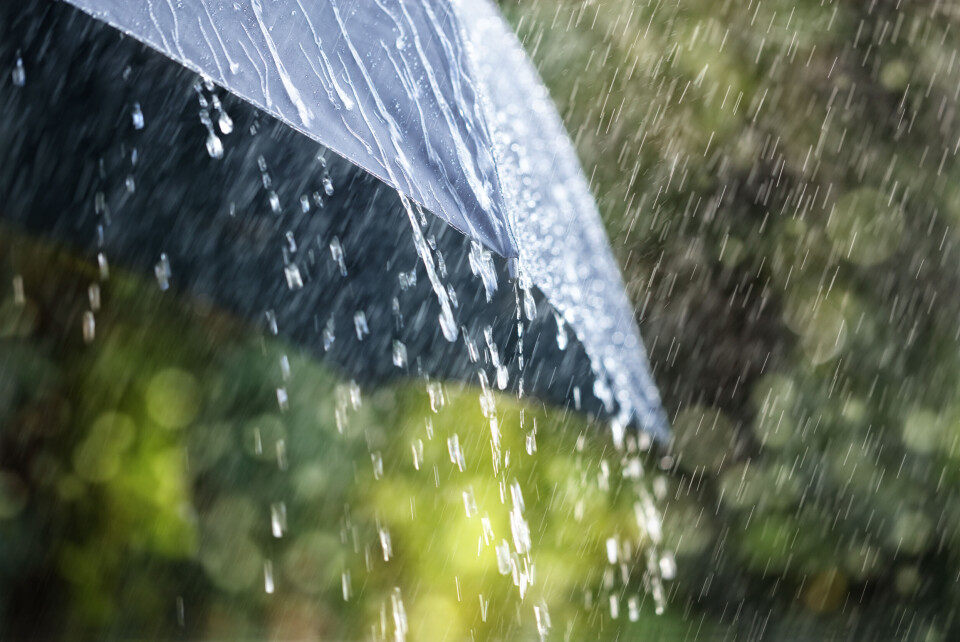-
Explosion at chemical plant near Lyon: where are other ‘at risk’ sites in France?
An estimated 2.5 million people live within a kilometre of a French Seveso site
-
Farmer blockades to continue on motorways over Christmas in south-west France
Protests are being maintained on the A64, A83 and A63 and on departmental roads
-
Interview: ‘UK-France relations will only get stronger this year’, says new British Ambassador
The Connexion speaks to Sir Thomas Drew, who took up the role on September 1
Storms and rain in new ‘Mediterranean episode’ in France this weekend
Up to a month’s rain could fall in a few hours, with forecasters advising caution amid seasonal yo-yo-ing temperatures causing cold nights and hot days

People in France are warned to be alert to flooding, landslips, and large waves on the coast this weekend (September 24-25), as a new ‘Mediterranean weather episode’ is forecast, especially in the southwest.
In an update on Twitter, Météo France said: “This weekend, a rainy storm episode will affect the southwest, with a probable Mediterranean episode.”
The weather will then move to the southeast by Monday (September 26), with intense storms and heavy rainfall expected.
Storm specialist observatory Keraunos. It said: “Our modelling shows a risk of strong rainfall.”
Un épisode méditerranéen apparaît de plus en plus probable pour le week-end prochain, avec risque de pluies intenses et pour le moment une instabilité prévue modérée à forte autour du bassin.
— Keraunos (@KeraunosObs) September 20, 2022
Le panel des modèles d'ensemble converge vers un risque de forts cumuls de pluie. pic.twitter.com/Jm6jNsuEJe
However, the areas that will receive the most rainfall are yet to be confirmed, said forecaster La Chaîne Météo, due to still-lingering uncertainty about how the weather episode will move.
Un épisode de fortes pluies ⛈️se précise pour ce week-end au sud de la France. Certains modèles prévoient des intempéries généralisées, notamment au sud-est (épisode méditerranéen) tandis que d'autres envisagent des cumuls abondants principalement sur les Cévennes (scénario 2) ⬇️ pic.twitter.com/UF6fRy3Prx
— La Chaîne Météo (@lachainemeteo) September 19, 2022
Currently, it looks as though the rising of hot air in the Mediterranean and from Spain could cause “an episode of strong rain this weekend in the south of France. Some models suggest general bad weather in the south east”, said the forecaster on Twitter.
Between 50-100mm of rain could fall on the Mediterranean coast and over the Pyrenees. Up to 10-50mm could fall over Lyon, Toulouse, and the Alps.
Météo France said: “Such conditions can cause often-violent, stationary storms. The equivalent of several months of rain can fall in several hours or over several days.”
The weather pattern is due to move north over France after having been over Spain and Portugal this week.
Weather website Météo Villes said: “From this weekend, the anticyclone (which is currently protecting France) will split in two and the situation will cause storms that come from Spain and the Mediterranean.”
The most recent similar weather pattern was the passing of Storm Alex in October 2020, which killed 21 people, and destroyed part of the Roya Valley in Alpes-Maritimes.
Read more: Storm Alex: Rebuilding goes on one year after valley floods near Nice
Read more: Storm Alex: French village resident tells of devastation
This weekend, Météo France has advised people to limit their journeys, cut off electricity or gas if necessary, not to use their vehicles, and to stay away from large bodies of water and the coast.
Low and ‘yo-yo-ing’ temperatures
Temperatures are expected to average at 16C for the northern half of the country, and up to 23C in the south. These are slightly lower than the average expected for this time of year.
Temperatures across the country have been ‘yo-yo-ing’ considerably in recent days, especially in the southwest. Regional newspaper La Dépêche highlighted, for example:
-
Montauban (Tarn-et-Garonne) saw temperatures rise by 20C in just a few hours
-
Albi (Tarn) went from 6C in the morning to 27C in the afternoon
-
Agen (Lot-et-Garonne), went from 5C in the morning to 26C later in the day
Pascal Bourreau, forecaster at Météo France, told the newspaper that these variations are "typical of the end of the summer, especially in the second half of September", due to a "night-time radiation" effect. This is caused by a lack of clouds to ‘contain’ the heat.
He said: “With the very clear nights that we are having at the moment, the heat of the day dissipates as the night goes on, and the temperature cools down very noticeably at ground level. The cooling is all the more marked because there is not much wind.”
“It’s a notable phenomenon, but very common. We always see the biggest increases at this time of year,” said Mr Borreau. “In 1972, we recorded a gap of 30C between the morning and afternoon in the Mont-de-Marsan region. It was 0C in the morning, and 30C by the afternoon.”
Related articles
Drought map: See what water restrictions apply in your department
























